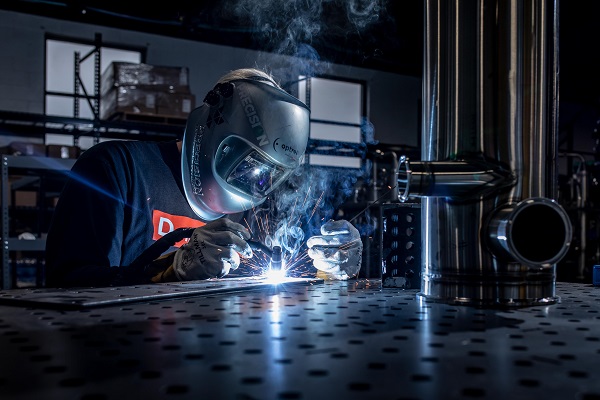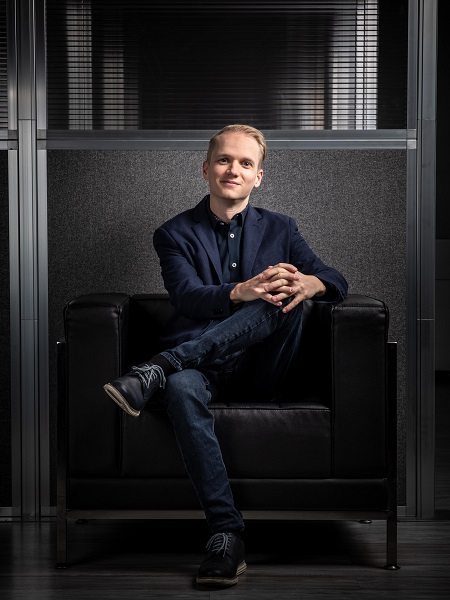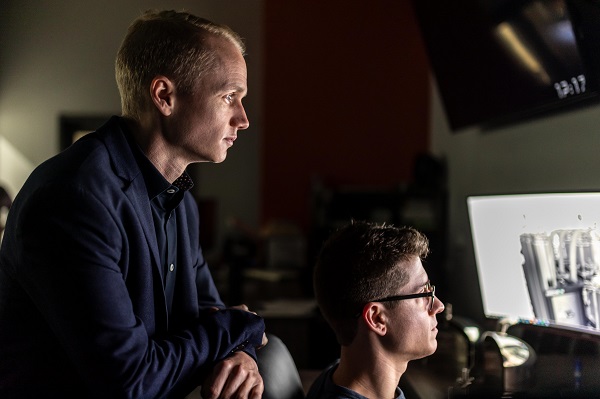
Technology innovation has played a major role in nearly every sector of the cannabis industry over the past few decades, but it’s difficult to imagine any segment of the market has benefitted more than extraction and oil. The appearance of the first vaporizer pens in 2010 changed the game, simultaneously making cannabis more socially acceptable and opening a massive new product category.
Behind the scenes, a sea change occurred as a new breed of entrepreneurs built high-tech machines that could isolate the plant’s chemical components and refine them into any number of new, high-end products. While “honey oil” and other crude versions of extracts have been around for many years—produced in barns and garages with varying results and explosions along the way—the extraction industry took a major leap forward when off-the-shelf, turnkey extraction machines began rolling off production lines.
Nick Tennant, co-founder and chief technology officer at Precision Extraction Solutions, closely watched the early efforts in extraction technology and became fascinated by the process. He was certain oils and extracts would account for a major piece of the cannabis pie moving forward, so he did what any aspiring entrepreneur would do: He collected a bunch of science journals and machine parts and started engineering an extraction rig at home.
One might expect the CTO for one of the most technical and science-intensive sectors in the industry to be an engineering or physics guru with a few geeky degrees under his belt. The assumption is incorrect when it comes to Tennant. He never finished college and studied science only because of his keen interest in cannabis cultivation and extraction technologies.
He now possesses extensive knowledge and experience in everything from cannabis and hemp extraction to code regulation, lab design, extract product and process development, and extraction equipment engineering. In his straightforward, folksy style, he enjoys explaining the concepts behind the magic to a new breed of entrepreneurs who will drive the next generation of craft cannabis and industrial hemp businesses…and use Precision’s machines to kickstart their dreams.
Humble beginnings
Tennant grew up in the bosom of a working-class family in suburban Detroit, where he attended a private school. Most of the other students were scions of wealth and privilege, and the dynamic made an early impact on his worldview.
“I felt like all these kids had everything handed to them, and it built a little bit of a chip on my shoulder,” he said. “Ultimately, I think that translated to just having this just fierce, fierce drive to be an entrepreneur. And then I think that got even more compounded when I started my paint restoration and automotive detailing company. I was constantly exposed to these people who seemed like they just did whatever the hell they wanted all day, and they’re all driving $100,000 cars. I said, ‘How are these people doing this? There’s got to be a mechanism to make a tremendous amount of money and still have your freedom.’ Since then, I’ve learned money is really the store of your economic value, and it’s like a three-legged stool: your money, time, and freedom. You sacrifice one to have the other two.”
Visits to friends and family in California and Colorado exposed a young Tennant to the nascent cannabis industry. One semester of college convinced him higher education would not help him achieve his goals, but cannabis…now that was fascinating. So, “I just kind of started learning about the culture and where it was headed and the potential and so forth,” he said. “When Michigan passed laws for medical in 2008, I was the forty-fourth person to get licensed.”
I’ve always been the person that if its subject-matter-relevant, I can teach myself how to do it.
From 2006 to 2010, Tennant familiarized himself with the cannabis industry and became an accomplished grower, manufactured edibles, established dispensaries, consulted with startups, and eventually launched his own cannabis school to share his knowledge with other up-and-coming weed entrepreneurs. “Ultimately, through my grassroots or my tribal knowledge in cannabis, I saw the birth of extraction happen,” he said. “Back then, people didn’t even really know how to extract correctly. They were just blowing cans of butane through a tube, and that was really the pinnacle of technology at the time.”
By 2012, Tennant was focused exclusively on extraction, believing the sector represented the future of cannabis. After all, there were parallels in other extraction industries, including botanicals and food flavorings, which have been multibillion-dollar industries for decades.
“I had no experience in technology, but I’ve always been the person that if it’s subject-matter-relevant, I can teach myself how to do it,” he said. “And I can sit there and focus for ten or twelve hours at a time, completely uninterrupted, and just soak it up like a sponge. But if it’s something that’s not relevant to me and my life, then I don’t have the attention span. I would just rather do something else.”
Tennant said he was determined to engineer a new breed of extraction machine from scratch, so he holed up in his house for about six months and immersed himself in the science and equipment behind the process: pressure vessels, assembly processes, temperature retention times, the molecular structure of cannabis, and how solvents interact with the plant. “I learned every single thing I could about how extraction of these molecules would take place and then built my first prototype,” he said. “We took it to a client that we were consulting for at the time, and he made oil with it and he’s like, ‘Holy shit, dude. You’re not taking this thing home. Here’s 15 Gs [$15,000].’ So, he kept [the machine], and I couldn’t get it back.”
After his initial success, Tennant built one prototype after another until he was satisfied with the industrial design and the quality of the oil the machine produced. He then approached his business partner and Precision co-founder, Marc Beginin, and they formally launched the startup. “We ended up doing a million dollars of sales in our first ninety days,” Tennant said. “That’s when we really knew it was going to be something bigger than we thought. I think we did about 4 million bucks in our first year, which would have been 2015, and we doubled it a year after that. I think we did like a 70-percent growth the year after that. And then we did 180-percent growth the year after that.”

Precision currently generates about $40 million in annual revenue and is one of the largest and most successful extraction equipment manufacturers in the world. Estimating the company’s share of the extraction hardware market is difficult, but Tennant believes Precision owns between 10 percent and 15 percent.
Over the course of his career, Tennant said one of the keys to his success has been his willingness to take chances. He understands the risk-reward factor in a dynamic, fast-moving, and competitive industry. He doesn’t shy from challenges in his business or personal life, and to underscore that, he cited one hair-raising—and humorous—example.
Like any other self-respecting Detroit native, Tennant is a devotee of fine automobiles—especially ones that go exceptionally fast. One of the first exotic cars he bought was a McLaren MP4, which is built with carbon fiber parts and tops out at a speed of about 215 miles per hour. In an episode of the Netflix series Fastest Car, Tennant and his McLaren faced off against other auto enthusiasts who own custom-supercharged American vehicles in a high-speed deathmatch. He said he wasn’t too worried about the outcome (he won), but he was concerned one of the other cars might damage his during the spectacle.
When he’s not racing, geeking out over cannabinoid research, or engineering a new extraction process, Tennant enjoys the simple pleasures in life. “I love to travel and explore new places, and I definitely enjoy meeting new people and having intellectually stimulating conversations with people who really understand holistic health,” he said. “I love visiting an organic fruit farm on a Sunday afternoon and getting organic produce. That’s really exciting to me, as weird as it sounds. It’s not as exciting as going on an amazing trip or something, but I’m a typical guy so, you know, cars, airplanes, all those things” occupy the moments when he’s not working.
The pitchman
Although his formal title is CTO, it’s obvious Tennant is involved in much more than the technical side of the business. He has a hand in everything from business development and research to marketing and sales. A natural pitchman, he appears in dozens of videos posted on YouTube, Precision’s homepage, and other media sites. In one of them, he stands in front of a massive industrial extraction machine located outside a partner facility in Dayton, Ohio. Sounding like a cross between a Ferrari dealer and a John Deere tractor salesman, he proceeds to matter-of-factly walk his audience through every step in the extraction process.
In another video entitled “Extraction Explained: How to Make Cannabis Extracts,” Tennant dons a white lab coat and explains complex manufacturing processes and scientific concepts in a way any layperson can understand. Published less than a year ago, the video has been viewed more than 350,000 times. In some respects, he seems to be just as interested in helping other entrepreneurs gain a foothold in the cannabis industry as in building his own company. For someone who is all-in on the picks-and-shovels aspects of the industry, that could be a winning strategy.
One of the things separating Precision from its competitors, Tennant said, is the company provides end-to-end solutions and services. Whether for a boutique, a craft brand that processes five to ten pounds a day, or a large-scale industrial processor that churns through 500,000 pounds, Precision has the machine for the job.
“It’s a massive value proposition relative to our competition that you can literally bring us a piece of dirt and we have internal architects, engineers, and designers who can design your entire facility and your entire building,” Tennant said. “We can do construction management and ensure your project is completed on time and on budget.” After the equipment is up and running, Precision conducts training and support so “ultimately, you’re walking away with a production facility that’s making a product you can stand behind, and you have a fully trained staff. There’s no other company in extraction in the world that can do that.”

In addition to its off-the-shelf machines, Precision also builds customized solutions that employ a variety of solvents—ethanol, hydrocarbons, liquid nitrogen—as well as solventless and multi-solvent systems. As the team creates new designs for extraction equipment, they have the benefit of easy access to the knowledge, experience, and know-how of the people who built the auto industry in Detroit over the past 100 years.
“When we need something done, we can get in the car and drive down the street or drive a couple hours and be in front of our production line, so that’s a huge, huge advantage for us,” said Tennant. “Ultimately, it means bringing products to market very, very rapidly. In a dynamic market that constantly shifts, it’s absolutely essential to do so.”
When he describes the growth path and opportunities for his company, Tennant sees a world of possibilities, the first of which is riding the wave of an expanding market where Precision currently enjoys 40-percent year-over-year growth. Another is in mergers and acquisitions, particularly in the wake of a pandemic that has taken its toll on both small and large companies in the industry. And then there is Europe, where he sees 750 million people and a cannabis industry infrastructure that’s slowly but surely coming together.
“You can imagine all these things can be done, and it’s resources versus capital constraints,” he said. “We can’t chase all the rabbits if we don’t have enough hunters and the infrastructure to chase all the rabbits, so to speak. But we think the growth potential for our businesses is really very high. I wouldn’t say limitless, but it’s a very attractive investment profile.”
Sharing the wealth
Scientific research is a critical part of Precision’s growth strategy, and Tennant is passionate about conducting research to better understand the cannabis plant and all its chemical components and interactions. “Right now, we’re working on how to completely isolate different cannabinoids and compounds and the best dosage for each,” he explained. “I’m personally conducting a ton of research on this topic, and it surrounds Precision’s centralized theme: How to use botanicals and the magic of plants to better stabilize humanity and human health moving forward.”
One of the most promising new targets for Precision’s machines may well be pharmaceutical companies, which have been conducting their own research on cannabis, covertly, and will be poised to start manufacturing if and when weed is removed from the Controlled Substances Act’s Schedule I list. The company has more than 150 clinical trials in process with various forms of cannabinoids. “The benchmark for pharma compliance is substantially higher than what’s being standardized in the [cannabis] industry right now, so it’s something we’re actively going after,” he said. “It takes some money to do that, so it’s just a matter of reaching that goal sooner rather than later.
“You have every single large pharma company looking at the industry, and the challenges are many, but the plant is so diverse,” he added. “You’ve got more than 100 cannabinoids now identified, and really each one of these cannabinoids has a unique effect on the human body and how it binds to the endocannabinoid system; how it interacts with your central nervous system. It ultimately produces a different outcome based upon what combinations of cannabinoids you’re administering. And what that results in is the potential to really treat, cure, and alleviate a massive number of human diseases, disorders, and pain and suffering.”

Since the beginning of his journey in cannabis, Tennant has been a collaborator, consultant, and teacher who openly shares his knowledge of the plant and extraction techniques with almost anyone who will listen. For entrepreneurs, no matter what business they are eyeing, Tennant said it’s important to be nimble and dedicated to education and research.
“Constantly be learning,” he advised. “Nothing is ever static, and success often is directly correlated with your ability to adapt and change. Those who don’t adapt will become irrelevant or get run over, or somebody will just straight-up out-compete them.”
Although Tennant has built a successful company, he said he made plenty of mistakes along the way. Many of those had to do with hiring and staffing decisions.
“If I had to give advice, I would say learn how to hire and surround yourself with the smartest and best people who are extremely successful. Whether it’s your marketing team or somebody for your operations, business strategy, finance, you have to absolutely have the best people,” he said. “But I think the best people represent one out of ten who come in for an interview, so if you want to have a business that goes to the pinnacle of success, good enough is not good enough.
“The other thing I recommend is you always bring somebody in that’s experienced in what you’re trying to do,” he continued. “Have somebody who’s a seasoned consultant, somebody who’s done it for twenty to thirty years. Don’t try to go it alone. Hire somebody who really has deep subject matter expertise.”
When Tennant talks about the extraction sector’s future, he points to the fact cannabis is expected to be a $130-billion retail market by 2028 and multiple sectors within the industry are only just beginning to emerge.
“That’s pretty damn big, right?” he said of the projection. “Ultimately, we see a very long runway for this business, and we have more than a decade before we even get close to thinking about or considering any sort of market saturation.
“I think the future state of cannabis looks something like craft versus the large production distillate and large production pens with reconstituted terpenes. Then, I see an entire pharmaceutical niche coming forth and moving toward GMP [good manufacturing processes] very heavily. Even in the medical markets, I see more production regulation, more traceability, more standardization, and more hurdles to jump over in order to get to a standardized manufacturing of cannabis extracts.
“And I think our philosophy surrounds that on a go-forward basis with our technologies and the types of things we’re [researching] and developing,” he added. “They all surround that kind of thesis.”












[…] 2014, Beginin teamed up with Nick Tennant, who for several years had been tinkering with new designs for more sophisticated and safer […]